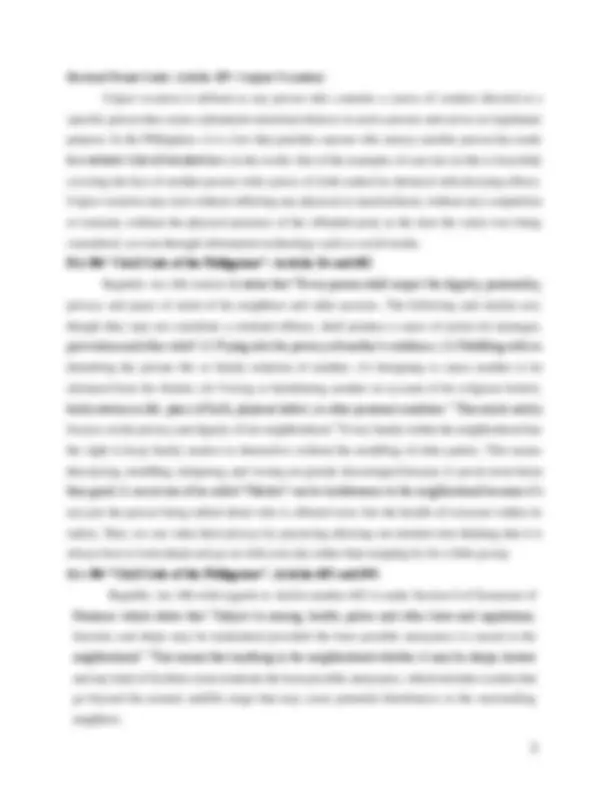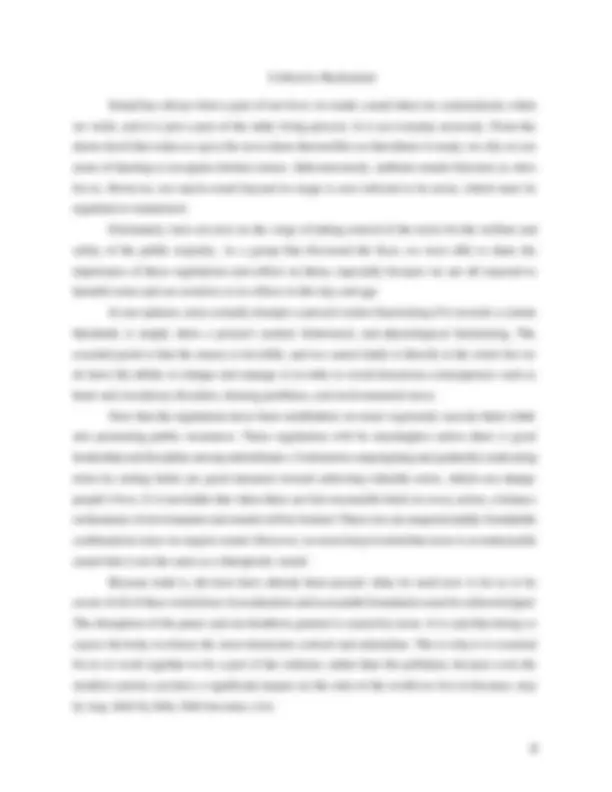




Study with the several resources on Docsity

Earn points by helping other students or get them with a premium plan


Prepare for your exams
Study with the several resources on Docsity

Earn points to download
Earn points by helping other students or get them with a premium plan
Community
Ask the community for help and clear up your study doubts
Discover the best universities in your country according to Docsity users
Free resources
Download our free guides on studying techniques, anxiety management strategies, and thesis advice from Docsity tutors
Essay on Noise Pollution, its effects, and related laws
Typology: Essays (university)
1 / 4

This page cannot be seen from the preview
Don't miss anything!



AUDITOR, Val Christian B. COLAS, Florence V. GERONA, Gleason Ray R. MODANZA, Tenth Ann G. REYES, Arc Anthony G. UCANG, Jullian Treceal W. GEC 18 Ethics November 21, 2022 BSN-2A Sources: Anti-Noise Crusaders of the Philippines (2022). An open letter to the president of the Philippines. Facebook. https://www.facebook.com/AntiNoisePollutionPH Arevalo, E. (n.d.). What is the allowable noise level and the distance of dB measurement for generator sets? http://www.powercity.ph/wp-content/uploads/2015/12/What-is-the-allowable-noise-level.p df Presidential Decree No. 1152 - Philippine Environment Code. (2020, March 26). Www.fao.org. https://www.fao.org/faolex/results/details/en/c/LEX-FAOC019099/#:~:text=Presidential% 0Decree%20No.- Republic Act No. 386 | GOVPH. (1949, June 18). Official Gazette of the Republic of the Philippines. https://www.officialgazette.gov.ph/1949/06/18/republic-act-no-386/ Revised Penal Code (An Act Revising the Penal Code and other Penal Laws No. 3815, December 8, 1930), Articles 155 and 248. (1930, August 12). International Commission of Jurists. Retrieved November 21, 2022, from https://www.icj.org/se-asia-security-law/revised-penal-code-1930/articles- 155 - 248 - the-revi sed-penal-code-an-act-revising-the-penal-code-and-other-penal-laws-no- 3815 - december- 8 - 1930 Revised Penal Code (An Act Revising the Penal Code and other Penal Laws No. 3815, December 8, 1930), Articles 155 and 248. (1930, August 12). International Commission of Jurists. Retrieved November 21, 2022, from https://www.icj.org/se-asia-security-law/revised-penal-code-1930/articles- 155 - 248 - the-revi sed-penal-code-an-act-revising-the-penal-code-and-other-penal-laws-no- 3815 - december- 8 - 1930
PD 1152: Philippine Environment Code PD 1152, the Philippine Environment Code, identifies noise as a cause of potential environmental harm; consequently, it must be controlled by defining criteria on the allowable level of noise to avoid any unwanted effects on humanity and the environment. Enacted on June 6, 1977 by former Philippine president Ferdinand Marcos, it aims to establish and maintain standards of air quality that preserve human health, minimize harm to plant and animal life, and protect property, as well as to advance the nation's social and economic development through the creation of standards and assignment of tasks to certain government agencies to protect the various areas of the environment – air, water, land, and noise is just one of the considerations being taken seriously. RA 8749 “Clean Air Act of 1999 The Philippine Clean Air Act of 19 99 is a policy and program aimed at maintaining clean air for Filipinos and reducing the adverse effects of air pollution on the country's economy, was implemented by the DENR to alleviate this air pollution problem. It also sets forth the government's initiatives to lessen air pollution and include environmental protection in development plans, was passed in 1999. It has 56 sections and 7 chapters. On June 23, 1999, it was approved by the Joseph Estrada Administration. In Article 1, the Basic Air Quality Policies are Section 1. This act shall be known as the "Philippine Clean Air Act of 1999." Section 2. Declaration of Principles. - The State shall protect and advance the right of the people to a balanced and healthful ecology in accord with the rhythm and harmony of nature. The State shall promote and protect the global environment to attain sustainable development while recognizing the primary responsibility of local government units to deal with environmental problems. The State recognizes that the responsibility of cleaning the habitat and environment is primarily area-based. The State also recognizes the principle that "POLLUTERS MUST PAY". Finally, the State recognizes that a clean and healthy environment is for the good of all and should, therefore, be the concern of all. Revised Penal Code: Article 155- Alarm and Scandal Except on Christmas or New Year's Eve, when it is anticipated or traditional, creating commotion or generating noise is always undesirable. Alarms and Scandal, Article 155 of the new penal code, is a positive move toward enhancing the welfare of all members of the community or setting where individuals from various origins have varying lifestyle preferences, noise tolerance levels, and methods for obtaining calm. The main point of this article is that it targets noise that causes public disturbance, chaos, and agitation because of scandalous acts intended to offend, annoy and attract attention that robs local residents of the peace they seek, conducive to rest and relaxation.
Collective Realization Sound has always been a part of our lives; we make sound when we communicate, when we work, and it is just a part of the daily living process. It is an everyday necessity. From the alarm clock that wakes us up to the stove timer that notifies us that dinner is ready, we rely on our sense of hearing to recognize distinct noises. Subconsciously, ambient sounds function as clues for us. However, too much sound beyond its range is now referred to be noise, which must be regulated or minimized. Fortunately, laws are now on the verge of taking control of the noise for the welfare and safety of the public majority. As a group that discussed the facts, we were able to share the importance of these regulations and reflect on them, especially because we are all exposed to harmful noise and are sensitive to its effects in this day and age. In our opinion, noise actually disrupts a person's entire functioning if it exceeds a certain threshold; it simply alters a person's mental, behavioral, and physiological functioning. The essential point is that the enemy is invisible, and we cannot battle it directly in the wind, but we do have the ability to change and manage it in order to avoid disastrous consequences such as heart and circulatory disorders, hearing problems, and environmental stress. Now that the regulations have been established, we must vigorously execute them while also promoting public awareness. These regulations will be meaningless unless there is good leadership and discipline among subordinates. Continuous campaigning and gradually eradicating noise by setting limits are good measures toward achieving tolerable noise, which can change people's lives. It is inevitable that when there are fair reasonable limits in every action, a balance on harmony of environment and sounds will be formed. These two are unquestionably formidable combinations since we require sound. However, we must keep in mind that noise is an undesirable sound that is not the same as a therapeutic sound. Because truth is, the laws have already been passed; what we need now is for us to be aware of all of these restrictions in moderation and reasonable boundaries must be acknowledged. The disruption of the peace and our health in general is caused by noise. It is said that doing so causes the body to release the stress hormones cortisol and adrenaline. This is why it is essential for us to work together to be a part of the solution, rather than the pollution, because even the smallest actions can have a significant impact on the state of the world we live in because, step by step, little by little, little becomes a lot.